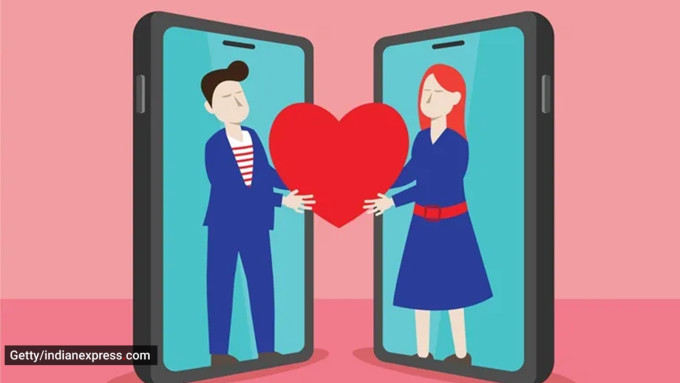What young daters are doing to ensure safety on dating apps: ‘It’s saved me from a few sketchy situations’
It’s 5 am. Divyanshi Bareja, 25, spent an entire night chatting with a guy she matched on Hinge. They hit it off from the word go, and she felt the elusive “spark”. Maybe that is why she, who usually moves the conversation to social media platforms like Instagram, forgot to do so. “My first mistake,” she admitted, talking to indianexpress.com. The next morning, when they eventually moved to Instagram, Bareja was stunned. “He had a different name. When I questioned him, he blocked me,” she recalled. On checking the man’s profile on Hinge again, Bareja found it wasn’t verified. “That was my second mistake,” she said.
Bareja’s experience is far from unique. Many have faced unsettling situations, or worse while using dating apps. The appeal of finding love online can draw people into the depths of the digital dating world, where dangers like catfishing, scammers, and harassment lurk.

 We asked 6 online daters, and experts from these dating apps themselves, for advice on what one must do to remain safe on these apps as they navigate the treacherous waters of digital dating. (Source: Freepik)
We asked 6 online daters, and experts from these dating apps themselves, for advice on what one must do to remain safe on these apps as they navigate the treacherous waters of digital dating. (Source: Freepik)
A survey by Tinder found that 98 per cent of young Indian daters consider safety features on dating apps important, and 56 per cent appreciate features that encourage good behaviour; 65 per cent believe that a verified profile makes a match more appealing. Photo verification has become one of the most valued tools in the quest for safer digital dating.
To dig deeper into this world, we spoke to six online daters—and experts from popular dating apps—what they recommend for staying safe in the often treacherous waters of online dating. What young daters are doing to stay safe:
Nikita John, 28
Nikita talks a lot to a match before meeting them in person, and always conducts a social media check. “I take my time chatting to filter out the weird ones,” she said.
Divyanshi Bareja, 25
Having been catfished before, Divyanshi now only talks to those whose profiles are verified on the dating app. For those who don’t know, nowadays, almost all dating apps have a verification feature, which helps identify if the person is real or not. She also doesn’t meet anyone without connecting on social media first.
Saira Hussain, 23
Saira doesn’t pursue the match unless they share credible mutual connections, who she can run background checks with. “It’s saved me from a few sketchy situations. Once, I reached out to mutual friends to check on a guy I was about to meet, and they warned me he was a known predator,” she said.
Eishita, 22, they/he
As a queer individual, Eishita says they tend to get sexualised by men because they “look like a guy” or the person sees them “as a challenge”. “It’s so easy to fall into traps like that. Because I don’t know if I’ll even be spared the grace to fight for justice if something bad happens,” they said. They also do not go out with people who they don’t have mutual friends with.
 For Leena, safety has mostly meant being safe on her end. So, she adds nothing identifiable in her profile. For eg: No college or workplace names so she can’t be stalked or googled. (Source: Getty Images/Thinkstock)
For Leena, safety has mostly meant being safe on her end. So, she adds nothing identifiable in her profile. For eg: No college or workplace names so she can’t be stalked or googled. (Source: Getty Images/Thinkstock)
Sejal Ved, 27
To confirm the person is not a catfish, Sejal uses video or audio calls, especially before meeting. “I’ve come across people with no social media presence who refuse to even call. That’s a red flag,” she says. Video calls also help her gauge comfort levels and avoid awkward first encounters.
Leena Jain, 26
For Leena, safety has mostly meant being safe on her end. “I prefer keeping details about my personal life limited unless I fully trust the person. So no mention of my full name, workplace, job title, institute, pictures of neighbourhood, or clothes with logo of my organisation, etc. People often ask where I work or what I do as part of their opening questions, so not having to discuss this also gives an opportunity to see whether they’re a good conversationalist,” she said.
What do the experts say
1. Verify profiles
Always be cautious when engaging with new profiles. Look for verified profiles, which often come with a blue tick or other authentication marks. Most dating apps offer a photo verification feature that compares profile photos with real-time images to confirm authenticity. Dr Chandni, a life coach and relationship expert with Tinder India, recommended starting with in-app chats and video calls to build comfort before meeting.
2. Keep personal information private
Avoid disclosing personal details like your home address, phone number, or daily routines too early. Lucille McCart, director of corporate communications at Bumble, advised withholding financial information and other sensitive data, such as email addresses or passwords, until you trust the person. Stick to the dating app’s chat or video features for initial conversations.
3. Watch for red flags
Be mindful of warning signs, including:
- Excessive flattery or “love bombing”.
- Pressure to meet quickly or requests for money.
- Evasive answers or overly dramatic stories.
- Reluctance to verify their identity.
 To protect yourself, stay on the app as long as possible, cross-reference social media profiles, and run a reverse image search on profile photos if anything seems suspicious. (Source: Freepik)
To protect yourself, stay on the app as long as possible, cross-reference social media profiles, and run a reverse image search on profile photos if anything seems suspicious. (Source: Freepik)
4. Keep friends or family informed
Before heading out for a date, make sure someone you trust knows your plans. Keeping your phone charged and using apps with real-time location sharing can help friends and family stay updated on your whereabouts. For an extra layer of safety, plan to meet in public, well-lit locations, and ensure you have your own transportation.
5. Don’t feel pressured
Move at your own pace and set clear boundaries. Whether it’s physical contact or agreeing to meet for drinks, prioritise your comfort. Dr Chandni advised against feeling obligated to do anything that makes you uncomfortable. If your match pushes your boundaries, that’s a major red flag.
6. Protect Yourself from Scammers
McCart said scammers often display these behaviors:
- Urgently asking for money.
- Avoiding in-person meetings while progressing emotionally.
- Probing for personal information while dodging questions.
To protect yourself, keep the conversations — text or otherwise — on the app as long as possible, cross-reference social media profiles, and run a reverse-image search on profile photos if anything seems suspicious.
📣 For more lifestyle news, click here to join our WhatsApp Channel and also follow us on Instagram
Disclaimer: The copyright of this article belongs to the original author. Reposting this article is solely for the purpose of information dissemination and does not constitute any investment advice. If there is any infringement, please contact us immediately. We will make corrections or deletions as necessary. Thank you.
